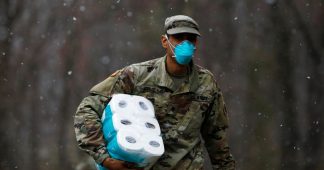By Anthony Torres
Oct. 22, 2020
Last week saw record devastation in Europe from COVID-19 with 700,000 new cases and 8,000 deaths from the virus—the highest since the pandemic began. The virus is spreading despite the limited health measures, such as regional curfews or closures of restaurants and bars, that the European ruling classes have taken in response to the resurgence of the pandemic.
These record figures underscore the bankruptcy of state policy of returning workers to work, and students to school to guarantee a continued flow of profits to the banks amid a raging pandemic. Millions of workers and youth are being exposed to a potentially deadly virus whose long-lasting impact on health is still largely unknown as part of a politically-criminal “herd immunity” policy.
At a press conference in Copenhagen Thursday, World Health Organization (WHO) regional director for Europe Hans Kluge said the situation is of “great concern.” He said COVID-19 is the “fifth leading cause of deaths and the bar of 1,000 deaths per day has now been reached.” While the number of deaths has not yet reached the levels of April 2020, Kluge warned however that without firmer prevention policies, projections showed by January 2021, mortality levels could be four to five times those recorded in April.
Citing the same epidemiological models, Kluge said that the generalized wearing of masks by 95 percent of the population, compared to an estimated less than 60 percent currently, could save 281,000 lives by February 1 in the 53 countries of the region.
In contrast, the limited measures taken by most European governments in recent days do not represent a move away from a “herd immunity” policy that threatens catastrophic loss of life. They are an attempt to lull to sleep workers and youth increasingly angry at pandemic policies that, by refusing to let youth and non-essential workers shelter at home, are leading Europe to disaster.
Yesterday, Spain became the first European country to log 1 million cases of COVID-19, six weeks after becoming the first European country to log 500,000 cases. It also recorded 575 deaths over the past week. However, the limited regional lock-down measures in Madrid and other major cities all require that youth and non-essential workers continue going to work and school, ensuring that the virus will continue to spread.
Belgium, the European country that had the most dead from COVID-19 per 100,000 inhabitants in the spring, announced that it would close bars and restaurants for a month as part of a curfew that began Monday. But on October 1, Belgium had revoked the obligation to wear a mask outside and the end of restrictions on private meetings. These policies will further favor the resurgence of the virus.
Eastern European countries are particularly hard hit by the resurgence of the pandemic. According to the European Center for Disease Prevention and Control (ECDC), the Czech Republic is the European country worst hit by COVID-19 over the last 14 days, with 521.5 infections per 100,000 inhabitants, more than France (299.7) or Spain (299.8). The government has asked the army to build a field hospital with 500 beds outside Prague.
In Poland, the government announced on Monday a new surge in infections. The national stadium in Warsaw is being converted into a temporary field hospital. New restrictions have been imposed in Warsaw and other major cities that have been classified as “red zones.” Mask-wearing is now mandatory, including in the streets.
All high schools and universities located in these red zones are closed and moving to online learning. Restaurants must close at 9 p.m., marriage ceremonies are forbidden and the number of people allowed into shops, public mass transit and religious services is limited.
In the British Isles, Ireland and Wales announced lock-downs for six and two weeks starting Wednesday and Friday, respectively, citing the necessity of halting the pandemic’s resurgence so that the population can celebrate Christmas under normal conditions. Only workers with essential jobs will be able to leave home to go work, others will have to stay in a 5 km radius around their home when they leave to get exercise, or face fines. However, schools—where much of the transmission of the disease is taking place—are to remain open.
Taoiseach Micheál Martin said that adopting a “herd immunity” strategy means “we should accept higher levels of illness and death, and it ignores the deadly long-term effects of the virus on many people. … The evidence of a potentially grave situation arising in the weeks ahead is too strong.” However, he refused to allow youth to study from home, insisting that youth “need their education” and thanking school staff for being “on the frontline” of the virus.
This followed a warning from Ireland’s National Public Health Emergency Team (NPHET) that the situation would become “unmanageable” without immediate emergency action. It warned that “hospitals will have great difficulty meeting demand over the coming weeks, and so extreme measures needed to be taken to avoid a catastrophe,” the Irish Post reported.
These arguments only further underscore the politically-criminal inaction of other European states that are worse hit than Ireland. There were 1,031 cases announced on October 19, and the incidence rate in Ireland is 261.7 COVID-positive cases per 100,000 inhabitants.
France, one of the worst-hit countries in Europe, closed restaurants and bars and imposed a 9 p.m. to 6 a.m. curfew in a dozen “scarlet zone” urban areas. With infections having hit over 30,000 per day, French President Emmanuel Macron said he would like to see 3,000 to 5,000 infections daily in a TV address Sunday. Hospitals are beginning to delay non-emergency surgeries and elective procedures to free up emergency room beds. Of 4,500 ventilator-equipped beds in France, 2,000 are now occupied by COVID-19 patients.
Though it is often presented as one of the best in the world, France’s health care system nearly collapsed in the onset of the pandemic in spring. As other countries across Europe, France now finds itself rapidly nearing the situation in the worst of the pandemic in March-April. Moreover, there is no guarantee that the medical system will be able to cope with the coming shock, as health workers were put under enormous stress for months, and there has been a wave of resignations to protest Macron’s leaving the health system unprepared for a resurgence of the virus.
Government promises made this summer to hire 15,000 new staff for public hospitals in order to improve working conditions and patient outcomes have yet to be fulfilled. An anesthesiologist at the Pitié-Salpêtrière hospital in Paris told the press that “compared to the spring, we are fewer, especially in terms of paramedics.”
A critical consequence of the lack of human resources in the hospitals is the impossibility of opening new ventilator-equipped beds, explained anesthesiologist Roland Amathieu: “We normally have a service with 13 beds, but now only nine are open because of staffing problems and a third are currently occupied by COVID patients.”
This underscores the class gulf separating broad masses of the working population, who were warmly thankful to health staff amid the onset of the pandemic in spring, from capitalist governments who left hospitals starved of funding and personnel to face a resurgence of the virus created by their own herd immunity policy. Their preoccupation was handing out trillion-euro bailouts to the major banks and corporations, even as millions of workers and small businessmen lost their jobs and livelihoods.
The struggle against COVID-19 requires the political mobilization of workers and youth against the criminally irresponsible policies of the ruling class. A general shelter-at-home order, in which workers, the self-employed and small businesses receive full funding while they cannot work, is the only way to avert catastrophe. This requires a struggle by the working class across the continent and internationally, to topple the European Union, expropriate the financial aristocracy, impound the necessary financial and industrial resources and build the United Socialist States of Europe.
Published at https://www.wsws.org/en/articles/2020/10/22/euro-o22.html











